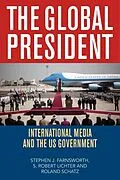In The Global President: International Communication and the US Government, scholars Stephen J. Farnsworth, S. Robert Lichter and Roland Schatz provide an expansive international examination of news coverage of US political communication, and the roles the US government and the Presidency play in an increasingly communicative and interconnected political world. This comprehensive yet concise text will engage and inform students in many intersecting disciplines, as it includes analyses of not just the Presidency, but US foreign policy and contemporary political media itself. The media developed to keep pace with the headwinds of political change are being asked more and more to adapt to and enhance the ways in which policy-makers, voters, and students make sense of the process of governance. The realities of an ever-changing political landscape are magnified nowhere more greatly than in the realm of foreign policy, and the stakes surrounding the need for quality communicational skills are no higher than at 1600 Pennsylvania Avenue because - when the voices of the US government speak - the world is listening. This book provides students a perfect entry point into the complex and amorphous relationship between media and government, where that relationship has been, and where it looks to be heading in the future.
Autorentext
Stephen J. Farnsworth is professor of political science and international affairs at the University of Mary Washington and director of the University's Center for Leadership and Media Studies. He is the author or co-author of several books on media and politics and a former daily newspaper journalist. Farnsworth was recognized with an award for his dedication and service to Pi Sigma Alpha, the national political science honor society, at the American Political Science Association Conference 2016.
Zusammenfassung
In The Global President: International Communication and the US Government, scholars Stephen J. Farnsworth, S. Robert Lichter and Roland Schatz provide an expansive international examination of news coverage of US political communication, and the roles the US government and the Presidency play in an increasingly communicative and interconnected political world. This comprehensive yet concise text will engage and inform students in many intersecting disciplines, as it includes analyses of not just the Presidency, but US foreign policy and contemporary political media itself. The media developed to keep pace with the headwinds of political change are being asked more and more to adapt to and enhance the ways in which policy-makers, voters, and students make sense of the process of governance.
The realities of an ever-changing political landscape are magnified nowhere more greatly than in the realm of foreign policy, and the stakes surrounding the need for quality communicational skills are no higher than at 1600 Pennsylvania Avenue because - when the voices of the US government speak - the world is listening. This book provides students a perfect entry point into the complex and amorphous relationship between media and government, where that relationship has been, and where it looks to be heading in the future.
Inhalt
Acknowledgments
Chapter 1. Global Communication and the US Government
Chapter 2. The World is Watching, Don't Look Back: News about US Politicians, People and Polities
Chapter 3. The Obama Presidency: International Media Perspectives
Chapter 4. The George W. Bush Presidency: International Media Perspectives
Chapter 5. US Foreign Policy and International News: Comparing Obama and Bush
Chapter 6. International News Perspectives on the 2008 US Presidential Election
Chapter 7. Globalization, International News and the US Government
Appendix
References
Index
